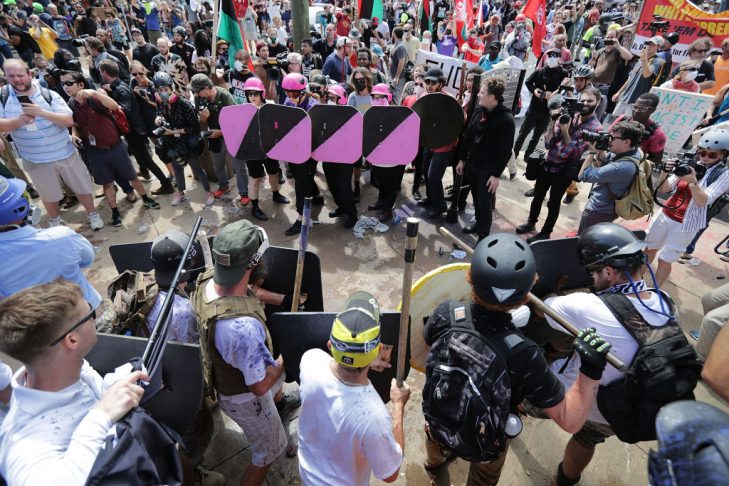I was 13 the first time I was called a dirty Jew. I don’t remember the moments before or after, but I will never forget the tone in his voice or his baggy black pants. He was a goth kid with a spiked collar and dark wavy hair that hung over his eyes. When he sneered at me, I didn’t feel scared or angry. I was shocked. Why was he insulting me, of all people? Shouldn’t we—two social outcasts—be natural allies against those who marginalize us? Did he come from an anti-Semitic family, or was I simply the only person he felt he could pick on?
The events of last weekend have highlighted something Jews have long understood—hatred is spread both explicitly and implicitly. The mob of angry faces in Charlottesville included avowed Nazis, white supremacists, and the Ku Klux Klan. These are the groups whose names send shivers down our spines. The people who actively propagate hate without shame or remorse. The terrorist groups whose activities are monitored by the ADL and the Southern Poverty Law Center. The enemies we know.
Far more insidious are the enemies we don’t know—the anonymous online trolls and alt-right “activists.” Claiming to take up the mantle of free speech and historic preservation, these aggrieved white men believe they’re simply defending themselves. They feel screwed by the economy, censured by liberals, and ignored by their government. They want to return to an era when working class white men had dignity and nobody policed their language. They don’t identify with Nazis, but they blame diversity for their lack of opportunities. They spew vitriol not out of hateful conviction, but as an act of rebellion against a system which blames them for all of society’s ills. In their narrative, they aren’t perpetrators—they’re victims.
One might feel sympathy for these embittered men. In fact, some of my Jewish friends do. There’s no doubt that white men—even poor ones—wielded greater power 50 years ago. But as many have pointed out, equality feels like oppression when you’re accustomed to privilege. These “oppressed” men want to “Make America Great Again” because they desperately want to feel empowered again. They feel disrespected at every turn and are willing to believe that external forces—liberals, immigrants, feminists, Muslims, etc.—are destroying their way of life. They don’t profess hatred toward minority groups, but they rationalize and endorse homophobic and xenophobic policies. Unlike the KKK or white supremacists, they don’t wear their anger on their sleeves. They keep their resentment simmering just below the surface.
The danger with simmering resentment, of course, is that it can rapidly come to a boil. The assassination of Czar Alexander II may have been a catalyst for Russian pogroms, but economic, social, and political resentment served as a pretext for them. The backdrop of Russia in the late 1880s feels eerily familiar: a quickly industrializing society, growing tension between urban and rural communities, and widespread economic anxiety. The Russian government was quick to direct public anger toward Jews and condoned—or even directed—violence against them.
You might expect me to continue by arguing that we’re on the precipice of American pogroms. That the extreme right is one match away from igniting widespread violence. I’m sorry to disappoint you. Alas, you must draw your own conclusions about how fearful Jews—or any minority group—should feel in today’s milieu. Instead, I want you to think of the citizens who participated in the pogroms in Kiev, Warsaw, and Odessa. Do you have sympathy for them? Knowing the conditions which led to their economic anxiety, do you empathize with them? Do you view them as bloodthirsty, torch-wielding mobs like the ones we saw in Charlottesville? Or do you imagine them as poor young men left behind in a rapidly changing world?
I’m not sure if I’m enlightened enough to have empathy for them, but I’m also not convinced that I should care about their intentions. What does it matter if they were unemployed, trouble-making youths or rabid anti-Semites? The end result was the same: lots and lots of dead Jews. In the same vein, I’m not sure why we keep trying to distinguish 4chan trolls from Nazis. If their hateful words and actions led to Heather Heyer’s murder, I don’t really care if they’re committed skinheads or antisocial video-game players. We need to keep an eye on the simmering pot just as much as the boiling one, especially when political opportunists are eagerly fanning the flames.
This post has been contributed by a third party. The opinions, facts and any media content are presented solely by the author, and JewishBoston assumes no responsibility for them. Want to add your voice to the conversation? Publish your own post here. MORE



